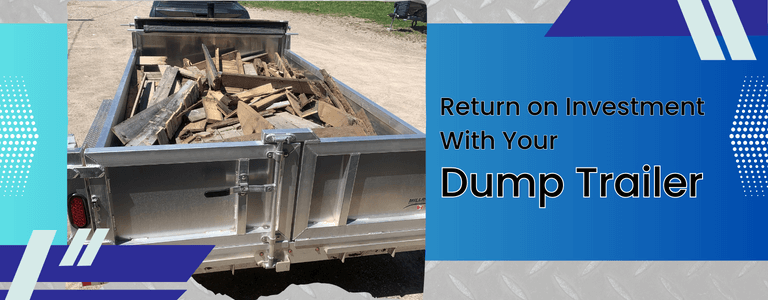
April 28, 2023 Last updated on June 16, 2023 by Bob Fisher Bob Fisher Tilt/Dump Trailers
An aluminum utility trailer is a perfect investment for individuals interested in a hauling business. Of course, you need a little planning to maximize your return on investment. Even a one-person enterprise can get complicated once you consider budgets, insurance and equipment. Fortunately, this handy guide can help you get started.
Every business has expenses and income; successful ones generate more of the latter. Unfortunately, it’s easy to get blindsided by unexpected costs, especially if you’re new to the industry. One way to avoid this is to create a budget.
Your budget should include estimates for all possible expenses:
You should also designate money for a contingency fund, allowing you to cover emergencies without dipping into operating costs. Additionally, most startups don’t become profitable for two to three years, so factor that into your startup cost calculations.
Personal savings, home equity loans and business financing are all excellent sources to fund your business. If you pursue commercial financing, you’ll need a business plan that includes your executive summary, marketing ideas, budget — and an outline of your services.
Setting prices is crucial and should be done after researching the market. Charging too much may deter people from seeking your services while charging too little impedes your ability to turn a profit. There’s also the question of how to calculate fees. For example, you can charge by weight, material or hourly. A good solution is to set a similar price to local competitors and adjust as you gain more experience.
Some industries are legally required to hold minimum levels of insurance, but these regulations vary by state. Before shopping for policies, check your state requirements to ensure you comply.
Even if you aren’t legally obligated to have commercial insurance, maintaining coverage has many benefits. For example, property insurance protects commercial buildings and equipment, covering repairs and replacement costs if you experience a fire, hurricane or theft. General liability pays for settlements and court costs if someone files a civil suit after sustaining an injury on your property.
As a dump trailer operator, you’ll need auto insurance to cover your hauling truck. Policies typically cover the cost of repairs and medical expenses if you get into an accident. You may also consider the following:
You need a truck that can reliably haul not only the trailer but its contents and do so for years. Heavy-duty trucks tend to be more expensive since they have powerful engines, but the alternative could cost you more in the long run. A powerful truck can move more material, allowing you to take on bigger and more lucrative orders. A lighter truck may help you save a few thousand dollars initially but force you to limit your hauling weight, narrowing your potential customer base.
Additionally, you need to consider what kind of jobs you’ll perform. For example, if you help people move, you may want a king cab to accommodate customers during transport. If you provide other services besides hauling (such as ice removal), you’ll need a truck bed large enough to store your equipment.
Of course, the most important step in becoming an independent operator is securing a reliable aluminum trailer. Your business depends on delivering top-quality service at each job, so you need a model that can perform under the toughest conditions.
Fortunately, Millroad Manufacturing can help you find it. Our customized designs come with a 5-year warranty and a quality guarantee. To learn more, visit our website or give us a call.